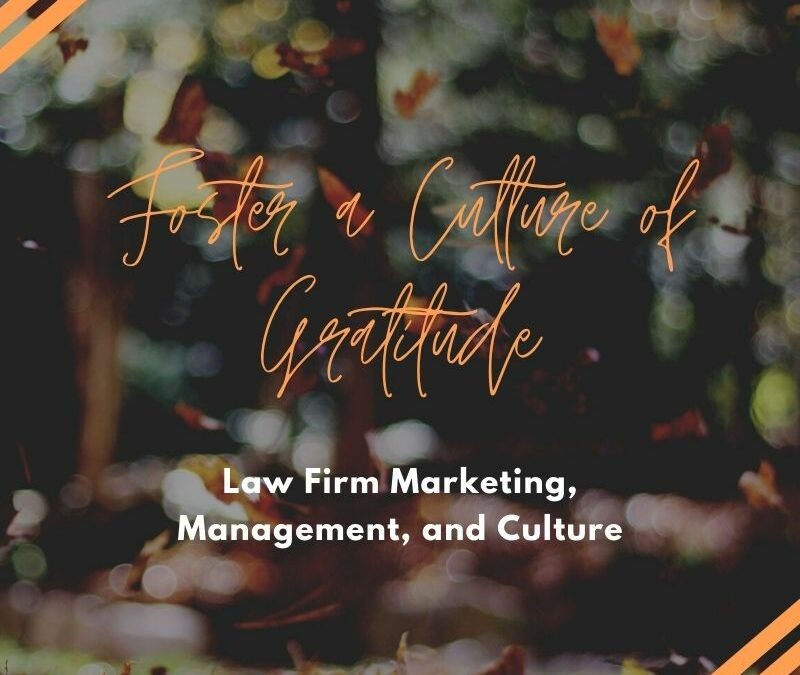Law Firm Marketing, Management and Culture: Foster a Culture of Gratitude
We’ve long known the benefits of affirmation and appreciation. Who doesn’t like hearing that they’ve done a good job or that the work they are doing matters? The more we feel appreciated, acknowledged, and affirmed, the happier we are and the harder most of us work to do a good job. It’s human nature. It starts when we can barely walk, proceeds through our school-age years, and continues throughout our adult life. In our personal lives, we readily recognize how our mood and motivation improves when our spouse shows they appreciate the work we’ve done at home or for our family. We see how well our children respond when they are praised for doing a good job at their chores or studies.
Just as in our personal relationships, affirmation works wonders in the business setting, too. When our staffs feel appreciated and affirmed, they are much more apt to go that extra mile to do their best work. When we show that we value their insights and welcome their ideas, they are more likely to feel vested in what we are trying to accomplish. Feeling affirmed not only boosts our confidence and self-worth but causes most of us to push even harder. Your staff and associate attorneys are no different.
Being grateful for your staff and showing it in meaningful ways, both big and small, can transform your firm. Taking action to create a firm culture of gratitude and affirmation can be a powerful catalyst that takes your firm to an entirely new level. Productivity can increase, stressful environments can dissipate, and morale improves. And when your employees are happy, guess what? Your clients will be happier too. It’s a domino effect.
If they aren’t getting it from us, we cannot expect our employees to show our clients kindness, respect, empathy, and appreciation. As Ken Hardison, Personal Injury Lawyers Marketing and Management’s (PILMMA) President puts it, “If you want your employees to be good to your clients, you need to be good to your employees, first. If you want your clients happy, you need to make your employees happy first.”

Many law firm owners show their employees appreciation through financial rewards or incentives, such as the Christmas bonus. I’m certainly not suggesting that you stop providing these financial rewards or incentives to your employees. They are tangible and concrete expressions that show you value your staff and want them to share in your firm’s success. But what I am suggesting is that by taking some simple steps, you can create a Firm Culture of Gratitude in your law firm that reaps benefits for you, your staff, and your clients all year long. These benefits may be more powerful and sustaining motivators than financial incentives.
In fact, The London School of Economics conducted extensive research and concluded that financial incentives may reduce an employee’s natural inclination to complete a task and derive pleasure from doing so. Glassdoor conducted a study that found that 80% of the employees polled would work harder if they felt their employer appreciated their efforts, and 70% said their self-image and attitude would be improved if their employer thanked them more regularly! (Vozza, The Science of Gratitude and Why it’s Important In Your Workplace, 11/14/16, Fast Company)
Psychology professor and gratitude researcher Robert Emmons considers gratitude vital to the workplace because it acts as a disinfectant against “exploitation, complaint, entitlement, gossip and negativity that often exist in the workplace. “Id. At the University of Pennsylvania, the Wharton School put this theory to test by dividing people into two groups and asking them to make fundraising calls to solicit alumni donations. One group was given a pep talk of encouragement before making the calls, and the other group wasn’t. And guess what? The group that received the pep talk made a whopping 50% more calls than the group that didn’t. Id.”
In his classic 7 Habits of Successful People, William Covey explains the importance of affirmation and appreciation this way: “Next to physical survival, the greatest need of a human being is psychological survival- to be understood, to be validated, and to be appreciated.”